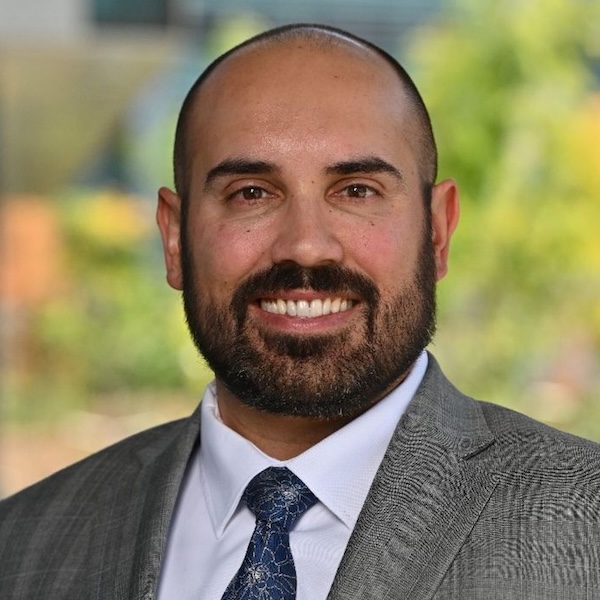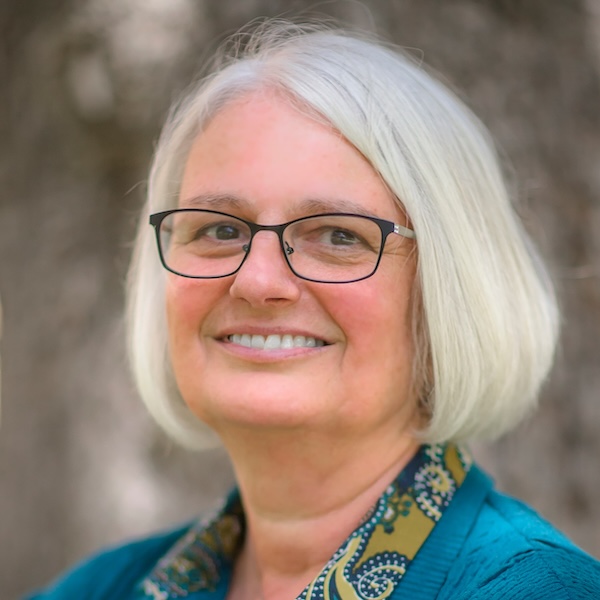NEW: Federal Transition Updates for Researchers Webpage
The CU Anschutz Medical Campus leadership, the University of Colorado's federal relations team and legal counsel are working closely to monitor the transitions and to better understand the potential impacts on our research community. We are committed to updating the campus community as early and as often as possible whenever definitive changes can be communicated.
Learn more
December 2024 Research Bulletin
Volume 5, Issue 6

Dear Research Colleagues,
I look forward to sharing this year’s research highlights during tomorrow’s State of Research Address, from noon to 1 p.m. Although the in-person registration has met the room capacity, I invite those of you who haven’t yet registered to join us virtually. It will be a wonderful opportunity to pause and reflect on all that our research community has achieved this past year and to look ahead to what the new year will bring.
As the year comes to a close and we’re preparing for the holidays, I also want to draw your attention to the Research Reminders & Resources section of this newsletter, where you’ll find information about coverage plans and emergency contacts for the Office of the Vice Chancellor for Research operations and services for those who will be on campus while the university’s operations are closed later in December.
Wishing you all the best in the New Year and success in your endeavors..
Sincerely,
Thomas Flaig, MD
Vice Chancellor for Research



CLINICAL RESEARCH OPERATIONS
Ben Echalier, MS, MBA
Assistant Vice Chancellor, Clinical Research Operations
Clinical Research Staff: We want to hear from you.
Help shape the future of clinical research by sharing your insights about job satisfaction, career trajectory and reasons for choosing CU Anschutz by completing our updated Workforce Development Survey. Your participation helps the Clinical Research Workforce Development Program assess the impact of new policies and practices informed by the survey results. For example, the 2023 survey results from more than 800 clinical research staff led to a new and improved onboarding experience in Canvas for Clinical Research Professionals.

COLORADO CLINICAL AND TRANSLATIONAL SCIENCES INSTITUTE (CCTSI)
Ron Sokol, MD
Assistant Vice Chancellor, CCTSI
Call for applications for funding opportunities
The CCTSI awards investigators with a variety of funding opportunities. We are now accepting applications for several of our grant award programs:
- Community Engagement and Health Equity Pilot Grant Program (CEHE Pilot)
- Translational Methods Pilot Program (TM Pilot)
We are also proud to announce a new program: the Pragmatic Electronic Health Record (EHR)-Embedded Trials (PEET) funding opportunity.
The PEET Program provides CU Anschutz project funding and UCHealth IT analyst support to implement an intervention directly through UCHealth Epic. Additionally, the PEET program conducts analyses on all funded PEET projects to enhance the efficiency of all future PEET projects UCHealth-wide. PEET projects will use pragmatic clinical trials design principles with the goal of making it easier for all populations and communities to be involved in research that matters to them.

PIs and Key Personnel: Prepare for changes to NIH Forms and Common Forms
Effective January 25:
- NIH Forms I: New attachment field for the Recruitment Plan to Enhance Diversity for T series and some K awards (NOT-OD-129). Modifications to the PHS Fellowship Supplement Form to improve peer review for NRSA Fellowship applications (NOT-OD-24-107). Adoption of Common Forms for Biographical Sketch and Current and Pending Support by May 2025 (NOT-OD-24-163).
- Simplified Review Framework: Updates and implementation plans for peer review of NIH research project grant applications (NOT-OD-24-085). Affected activity codes include R01, R03, R15, R21, U01 and others. Funding opportunities will be reissued with the new framework, and updated application forms (FORMS-I) will be required.
- InfoEd: NIH Forms I have been available in InfoEd since late November and must be used for applications due on or after January 25, 2025. Proposals for the January 25th deadline or later must use Forms I (NOT-OD-24-086).
Effective May 25:
- Common Forms, ORCID ID and SciENcv: ORCID IDs (see additional info in Office of Regulatory Compliance update) and SciENcv will be required for all Senior/Key Personnel for applications due on or after May 25, 2025. All Biosketch and Other Support forms must be generated using SciENcv to avoid submission errors.
- Support Resources: The Research Informatics Office (RIO) has created a dashboard for ORCID ID registration, and the National Library of Medicine offers YouTube tutorials and webinars for creating a Biosketch with SciENcv and integrating it with ORCID ID.
- The extramural Nexus has an Open Mike article if PIs would like to read more about the Open Mike article here.
Additional information will be provided in upcoming RAIN meetings..

LABORATORY ANIMAL RESOURCES
Jori Leszczynski, DVN, DACLAM
Assistant Vice Chancellor, Office of Laboratory Animal Resources
New resource for researchers studying veterinary diseases and animal models of human disease
OLAR recently hosted the CSU Experimental Pathology Facility, a new core resource available to our investigators. The facility is staffed by board certified anatomic and clinical veterinary pathologists with expertise in laboratory animal models. They are available to read slides and consult on projects. For more information, please watch the recording of the November 4 Town Hall Meeting and visit the experimental pathology facility website.

New standards required for storage of NIH data, effective January 25
If you are planning to access and download data from one of the controlled access NIH data repositories, such as dbGaP, the data must be stored in an environment certified to meet NIST SP 800-171.
The only currently certified environment on the CU Anschutz campus is the Secure Local Computer Environment (SLCE) hosted by the SOM Information Services team.
Please contact Dalan Jensen, IT Research Director in the SOM Information Services team, to discuss your project requirements before you apply for data access, as there are associated costs.
If you are already hosting this data in another environment, you will need to migrate your data to SLCE prior to the renewal date, so please reach out to Dalan to discuss the transition plan.
ORCID IDs: Additional information about this new requirement
An ORCID ID is a free and unique persistent identifier (PID) that disambiguates you from other researchers. Effective May 25, the NIH will require all Senior/Key Personnel to link their ORCID ID to their eRA Commons Personal Profile, and to enter their ORCID ID into the Persistent Identifier (PID) section of their Science Experts Network Curriculum Vitae (SciENcv).
This guideline will apply to all application types (New, Resubmission, Renewal, Revision) submitted for due dates, or submitted early for intended due dates, on or after May 25, 2025.
If you need to create an ORCID ID:
Visit https://orcid.org/register and complete the registration.
If you already have an ORCID ID:
Link your ORCID ID to the eRA Commons Personal Profile and update the Persistent Identifier section of your SciENcv profile. Be sure to include your ORCID ID when you submit new papers for publication.
If you have questions, please contact your grants administrator or Hannah Pollard, Strauss Library Scholarly Communications Informationist, at hannah.l.pollard@cuanschutz.edu.
/buccini-headshot-2022-copy.jpg?sfvrsn=13d5dbb_0)
RESEARCH DEVELOPMENT AND STRATEGY
Laura Buccini, DrPH, MPH, MA
Assistant Vice Chancellor, Research Development and Strategy
New NIH resource helps find fit between research projects and ICOs
The National Institutes of Health (NIH) recently launched a new online resource, Find a Fit for Your Research: NIH Institutes, Centers, and Offices (ICOs), to help researchers pinpoint which NIH ICO is most likely to support their projects.
Ensuring strong alignment between project ideas and the mission and priorities of NIH ICOs is an important part of pre-submission strategy. This tool consolidates ICO funding profiles, special initiatives, strategies and links to funding opportunities to assist in this process. Take advantage of it and other resources—including the Assisted Referral Tool (ART), which recommends potentially appropriate study sections—to increase your competitiveness for NIH funding.

Coverage for OVCR Services During Closure of University Operations
University operations at the CU Anschutz Medical Campus will be officially closed from end of business on Friday, December 20, through Friday, December 27, resuming Monday, December 30, and then closed on Wednesday, January 1. The following plans are in place to ensure that critical research operations can continue without interruption during the closure:
Laboratory Research
For a laboratory emergency (water leak, fire, abnormal smell/odor, etc.), contact CU Anschutz Campus Police at 4-4444 or 911 from a campus phone (or 303-724-4444 from a mobile phone). University Police Dispatch will notify appropriate campus resources to respond to the situation.
Clinical/Community Research
If you have an emergency or urgent request for COMIRB during the closure, email John Heldens, Assistant Vice Chancellor for Human Research Protections, at john.heldens@cuanschutz.edu. For Clinical Research Administration, contact Cat Sutherland, Director of Clinical Research Administration, at catherine.sutherland@cuanschutz.edu. Central email accounts will be monitored for urgent messages.
Environmental Health & Safety (EHS)
EHS will be on call but not on campus during the holiday closure. During this time, EHS will not be providing routine services, such as hazardous waste pick-up, radiation package deliveries, irradiator escorting, etc., so please plan ahead for your EHS needs. The last biomedical waste (“red tub”) pick-ups of the year will be on Thursday, December 19, so ensure that your waste is ready for pick-up that morning. For lab-related emergencies, contact University Police at 4-4444 or 911 from a campus phone (or 303-724-4444 from a mobile phone) and Police Dispatch will contact EHS.
Office of Laboratory Animal Research (OLAR)
Our offices will be closed on December 24 and 25, and on January 1. If you have an animal health emergency or you need emergency assistance on any of those days, please call the veterinarian on-call (on-call information is posted in the vivarium in multiple locations).
We will be lightly staffed for the remaining days that university operations will be closed, and you can reach us at our main office number: 303-724-2322.
Animal order deliveries, internal transfers and imports/exports will be suspended from December 20 through January 1. For more information, please refer to the OLAR Intranet: Resources for Researchers or email OLAR.Admin@cuanschutz.edu.
If you require veterinary and non-veterinary technical assistance on university recognized holidays, weekends and during campus closures, OLAR has a formal process for requests:
- Request veterinary technical assistance (1-week lead time)
- Request non-veterinary technical assistance (2-week lead time)
Research Information Technology (RIT)
- For OnCore system outages, email oncoresupport@ucdenver.edu and indicate an outage in the subject line.
- For urgent issues with the InfoEd eRA system, such as a major interruption in service, contact the UIS Service Desk at 303-860-HELP or email help@cu.edu and provide as much information as possible. For less urgent matters, please submit issues via email to erahelp@cu.edu.
- OLAR: For Cayuse/eSirius system outages, email IACUC@cuanschutz.edu. The group email will be monitored all week.
The Research Bulletin shares timely news and announcements from the Office of the Vice Chancellor for Research.
Email researchadmincomm@cuanschutz.edu with content submissions for future editions.